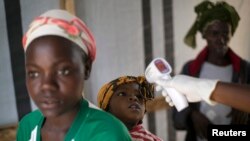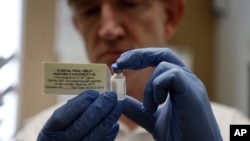West Africa experienced several highs and lows in 2015 in its fight against Ebola.
There was elation when Liberia was declared Ebola-free in May, but defeat when it returned and claimed more victims, although the virus was quickly suppressed. Sierra Leone was declared Ebola-free in November.
In December, two years after a toddler died in the forested region of Guinea, the World Health Organization declared that country free of Ebola.
Dr. Bruce Aylward, the WHO's special representative for Ebola, made the announcement just before the year's end.
"As of today, for the first time in two years, we can say that all three countries have stopped the original chains of transmission," he said.
In a news release, he cautioned that the coming months would be "absolutely critical.” The release said, “The time-limited persistence of virus in survivors, which may give rise to new Ebola flares in 2016, makes it imperative that partners continue to support these countries."
Ready to respond
The WHO said it would maintain surveillance and outbreak response teams in the three countries through 2016. Ebola killed more than 11,000 people and sickened more than 28,000 across 10 countries, but the majority of the victims were in Guinea, Liberia and Sierra Leone.
Experts like Dr. Anthony Fauci at the National Institutes of Health warn that the virus can re-emerge. "All of us in the public health sector believe that there will be other Ebola outbreaks, and that’s the reason why we need to be prepared," he told VOA.
Dr. Tom Frieden, head of the U.S. Centers for Disease Control and Prevention, said in an interview in 2014 that when all was said and done, the goal was to leave Guinea, Liberia and Sierra Leone with stronger health systems.
"What we hope will happen coming out of this is that we not only stop this outbreak, but that we put into place the labs, staff and emergency response capacity to stop the next Ebola or the next health threat," Frieden said.
Following the WHO statement, Frieden described the development as a "tremendous achievement for Guineans and all the partners who helped them reach this milestone."
Frieden, too, cautioned that even in the celebration of Ebola's defeat, "we must not let down our guard. It is important to build an even stronger public health system ready for possible future cases of Ebola, and work to prevent and control other diseases.”
Vaccine now available
Experts agreed that there may be a few flare-ups with a small number of cases, but they do not expect another epidemic because now there's a vaccine that can stop Ebola.
No scientist likes to say something is 100 percent effective, but Dr. John-Arne Røttingen of the Norwegian Institute of Public Health said, "Based on the number of individuals and the number of cases that we have seen, there is 100 percent protection in those vaccinated" against Ebola. Røttingen was one of the co-authors of the rVSV-ZEBOV Ebola vaccine trial that started in early 2015.
In the case of future Ebola flare-ups, health officials plan to vaccinate all of a patient's contacts, and then the contacts of those people, if warranted.
The World Health Organization says its goal now is to revitalize key public health programs in the three countries, especially in the areas of maternal and child health.
Separately, the World Bank Group announced it has mobilized $1.62 billion in financing for Ebola response and recovery efforts. World Bank Group President Jim Yong Kim issued a statement saying the organization is committed to help Guinea, Sierra Leone and Liberia rebuild their economies and strengthen their health systems.
"We will do everything we can to help these countries and the world prevent another deadly pandemic,” the statement said.













